As Edmund enters the White Witch’s courtyard, he looks up and sees what appears to be a giant man about to hit him with a club, but it turns out to be a stone statue. Fans of the book will recognize this as Rumblebuffin the giant, who becomes a major source of comic relief in the second-to-last chapter. In this movie, he’ll just be a cameo since giving a lot of characterization to minor characters who aren’t introduced until a story’s climax doesn’t seem to work as well in a movie as it does in a book. (That’s one of the reasons literature is the more interesting of the two mediums in my opinion but never mind about that now.)
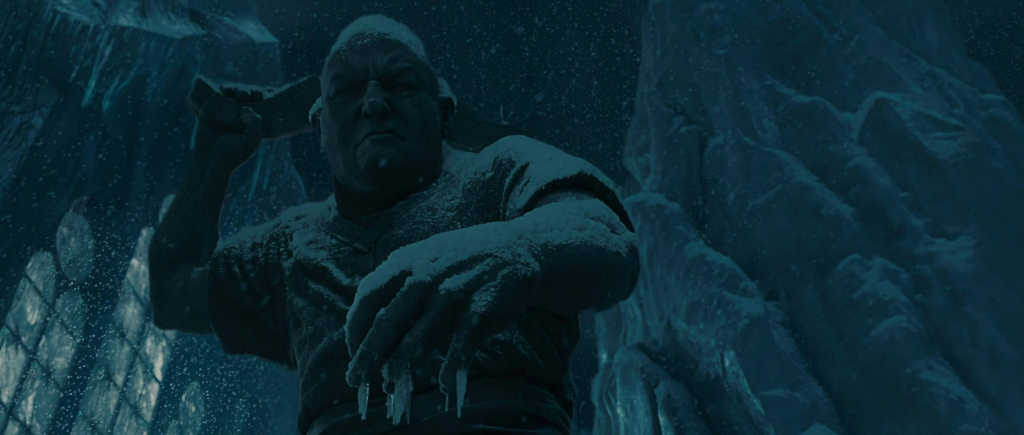
Edmund cautiously makes his way across the courtyard, which is full of stone statues of Narnian creatures, all of whom look as if they’re either about to attack or are cringing in terror. Since this version of the story hasn’t established that the White Witch turns people to stone yet[1]Though genre-savvy viewers probably guess she does at this point., this scene arguably doesn’t make the same impression as in the book but that doesn’t mean it makes a bad impression. Sheesh, you could argue it’s more interesting if we don’t know what the statues are right away. It’s a wonderfully eerie bit.
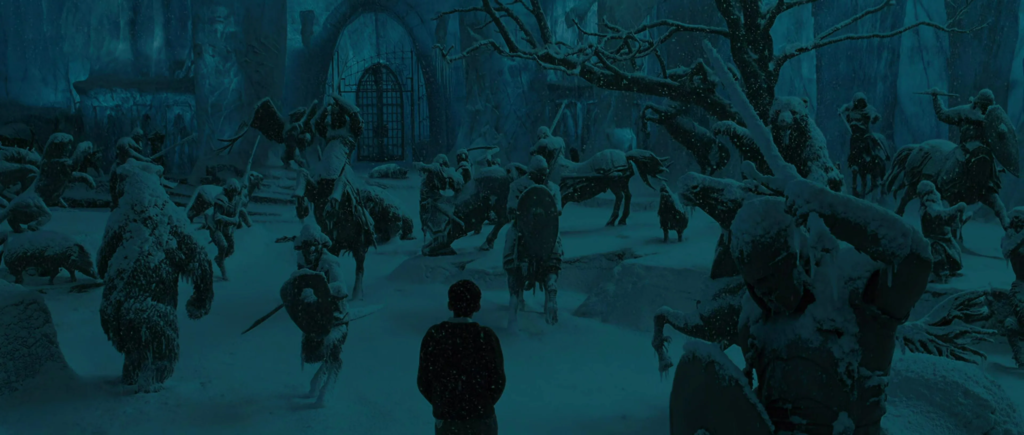
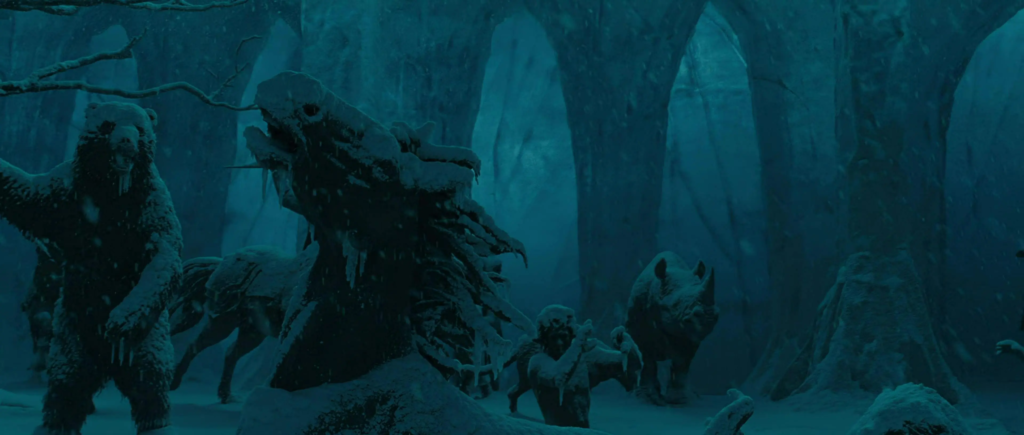
At one point, Edmund’s feet brush against a pile of charred logs on the ground. He picks one up and makes an ash moustache and glasses on the face of a stone lion. In the book, the reason Edmund does this is that he believes the stone lion[2]Who also becomes a source of comic relief at the climax by the way. is Aslan, the sound of whose name has filled him with such dread. But in the movie, we haven’t been told Aslan’s species yet, so this moment feels a bit random and doesn’t really fit in with the scene’s creepy tone. Maybe it would have been better if, as in the book, the lion were the first statue Edmund encounters.[3]This was so in an earlier draft on the screenplay.
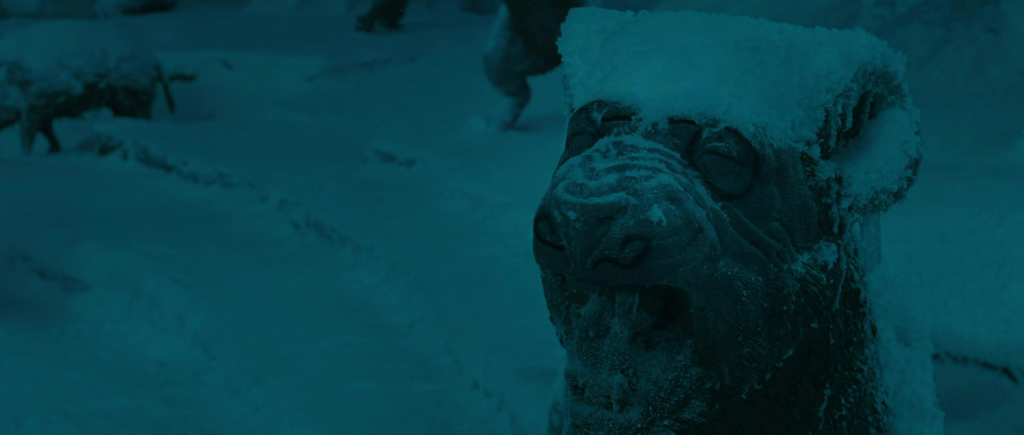
In a great jump scare albeit one the book handed to the movie, Edmund tries to step over what appears to be a stone wolf, only for it to rear up, snarling, and pin him to the ground. “Be still, stranger, or you’ll never move again,” it says (in Michael Madsen’s voice), “Who are you?” Michael Madsen is the only voice actor in the movie whose casting I can’t decide if I like. He sounds suitably gruff and scary but something about his line readings bothers me just a tad. Maybe it’s because he’s the only Narnian in the film who sounds like he has an American accent. The others either speak with English accents of some sort or another or sound too generic to place.[4]Another exception is Kiran Shah as Ginarrbrik with his Persian accent. Since this wolf is one of the White Witch’s followers though it arguably makes sense to give him a different accent from the followers of Aslan. But, given the historical backdrop the movie has established, wouldn’t it make more thematic sense for the bad guys to have German or Japanese accents?[5]For the record, I don’t think either the movie or the book should be interpreted as a metaphor for World War II. That idea really falls apart if you think about it for any length of time. C. S. … Continue reading I guess that would have had its own drawbacks. Maybe it just bugs me that this wolf is written like a generic bad guy from a pulpy, even cheesy, action movie and has a voice to match. Of course, the character was always a generic bad guy but not a pulpy one. Anyway, Edmund hastily explains his identity and his relationship to the Witch. The wolf lets him up. “My apologies,” he says, “fortunate favorite of the Queen-or else not so fortunate.” That line is from the book. It’s kind of sad that that’s rare enough to be worth mentioning.

The wolf leads Edmund upstairs to an empty throne room and tells him to wait there. Once he’s alone, Edmund sits on the throne and grins, obviously imagining himself king. “Like it?” asks a cold voice. Edmund jumps up as the Witch enters, followed by Ginarrbrik. Since I just described the movie’s writing, for one character anyway, as being pulpy and even cheesy, I’m happy to say that the following exchange is one of the best written parts of the movie and even improves on the book by having the Witch toy with Edmund before unleashing her anger on him.
Witch: Tell me, Edmund, are your sisters deaf?
Edmund: No.
Witch: And you brother, is he…unintelligent?
Edmund: Well, I think so, but Mum says-
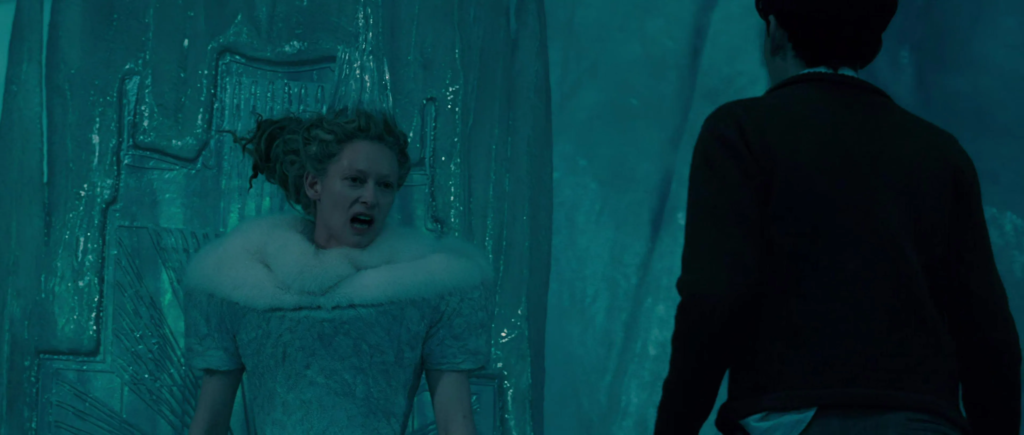
“Then how dare you come alone?!” shouts the Witch. Edmund feebly protests that it’s not his fault as the Witch continue to lay into him. “I did bring them halfway,” he says, “they’re at the little house at the dam with the beavers.” Ginarrbrik raises his eyebrows and the Witch, after pausing and twiddling her fingers a bit, resumes her former iciness. “Well, I suppose you’re not a total loss then, are you?” she says. Then she turns back to her throne, clearly having no more interest in Edmund. “I was wondering,” he says, “could I maybe have some more Turkish Delight now?” The Witch turns to Ginarrbrik. “Our guest is hungry,” she says coldly. (Sorry for all the corny winter-related puns in this post. And right after I called the movie’s dialogue cheesy! Those puns are just so irresistible.) Ginarrbrik starts to lead Edmund out of the room at knifepoint, saying, “This way for num-nums!” In the book, it’s actually a different dwarf who brings Edmund food and drink. I kind of wish that could have been kept to show that the Witch has many dwarf minions, not just one, but fantasy movies like this are expensive enough without unnecessary speaking parts. Edmund and Ginarrbrik pause as the Witch calls, “Maugrim,” which viewers may remember was the name of the captain of her secret police. The wolf steps forward. “You know what to do,” she says. Maugrim howls and more wolves appear out of various alcoves and entrances. As Edmund looks on in horror, they run out of the room and out the castle. The movie does a good job of making them look scary except for one ill-advised slow motion shot where they’re obviously regular wolves and not evil. Slow motion is usually a bad idea in my opinion. It looks silly way too easily.
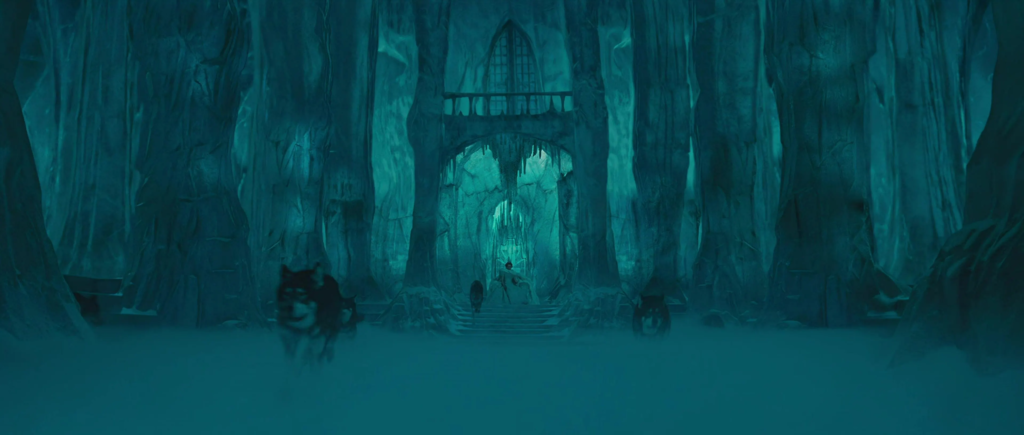
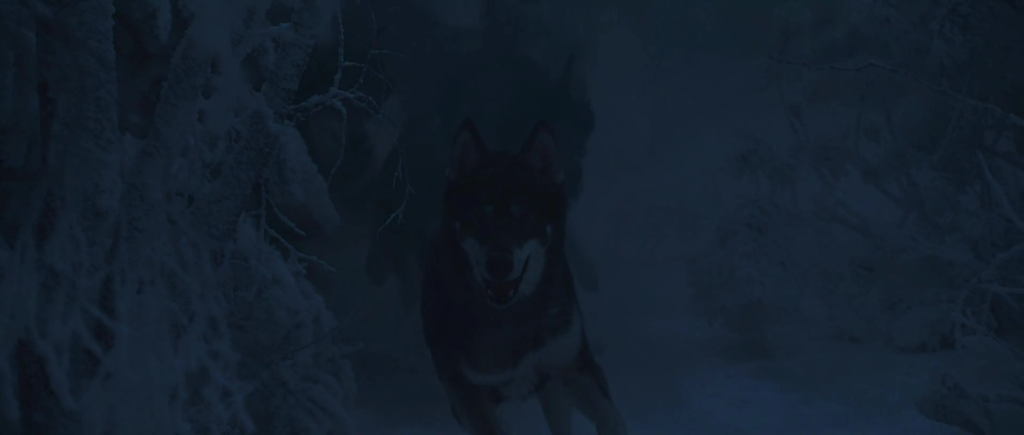
“Hurry, mother, they’re after us!” cries Mr. Beaver as he bursts into his home with the non-treacherous Pevensies. “Right then,” says Mrs. Beaver and begins packing. “What is she doing?” Peter demands. Mr. Beaver just throws up a hand in exasperation. “You’ll be thanking me later,” explains Mrs. Beaver. “It’s a long journey and Beaver gets pretty cranky when he’s hungry,” to which Mr. Beaver says, “I’m cranky now!” As a fan of the book, I have mixed opinions about this scene. On the one hand, Mrs. Beaver calmly packing while everybody else freaks out about the coming secret police is one of the funniest parts of the book and I love that it’s included here. On the other hand, it feels like the comedy here is more at Mrs. Beaver’s expense than it is the book. There, when everyone else protests that they need to get away as soon as possible, she calmly explains that they have no hope of outrunning the Witch or her forces in any case and that their best bet is to “keep under cover and go by ways she won’t expect” and that it’d be foolish for them to leave without taking any food, all of which is true in the movie too but it doesn’t feel that way in the moment. The only ridiculously silly thing Mrs. Beaver says in the book’s version of this scene is “I suppose the sewing machine’s took heavy to bring?” Even that is somewhat understandable, given what the secret police did to Tumnus’s house. No sewing machine is mentioned in the movie. How do you write a version of Mrs. Beaver that leans into comedy and not include that hilarious line about the sewing machine? Pearls before swine, I tell you, pearls before swine!
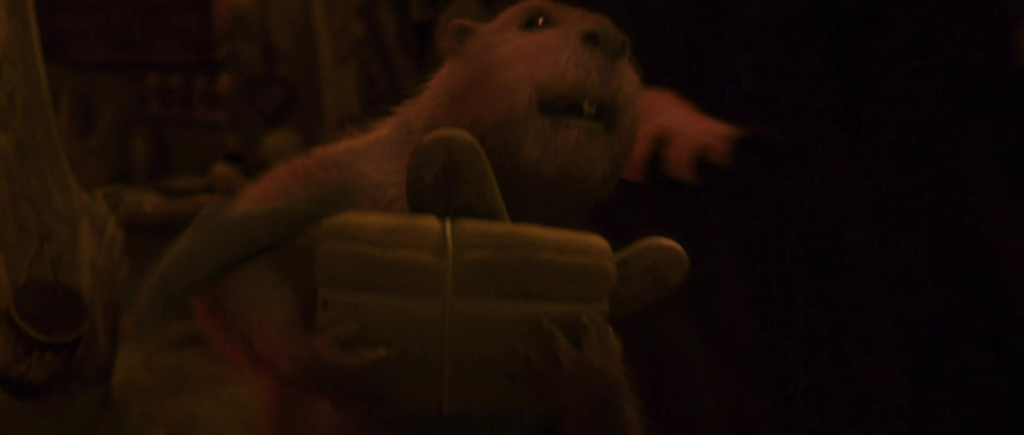
The wolves arrive and start tearing through the walls of the house. (Don’t ask me why they don’t try breaking down the door.) But once inside, they find the place empty. One of them finds a cupboard opening to a secret underground tunnel, which sort of corresponds to the “old hiding place for beavers in bad times” in which our heroes took refuge for the night in the book. “Badger and me dug this. It comes out right near his place,” explains Mr. Beaver. “You told me it led to your mum’s!” says Mrs. Beaver accusingly. Do you see what I mean about the movie leaning into cliches about bickering married couples with these characters? Lucy trips on a root and when the others stop to help her, they hear that the wolves are now in the tunnel. In the book, our heroes leave well before the secret police arrive and are able to avoid them. While adding a chase scene is arguably part of making Mrs. Beaver’s preparations come across as sillier, I don’t necessarily mind since I love a good chase scene and while a chase scene is technically against the spirit of the book in that it’s not from the book, it doesn’t feel deeply antithetical to it or anything. Setting the source material aside, how does the ensuing chase scene work just as a chase scene? Well, it’s fine though I don’t think anyone would call it a highlight of the film.
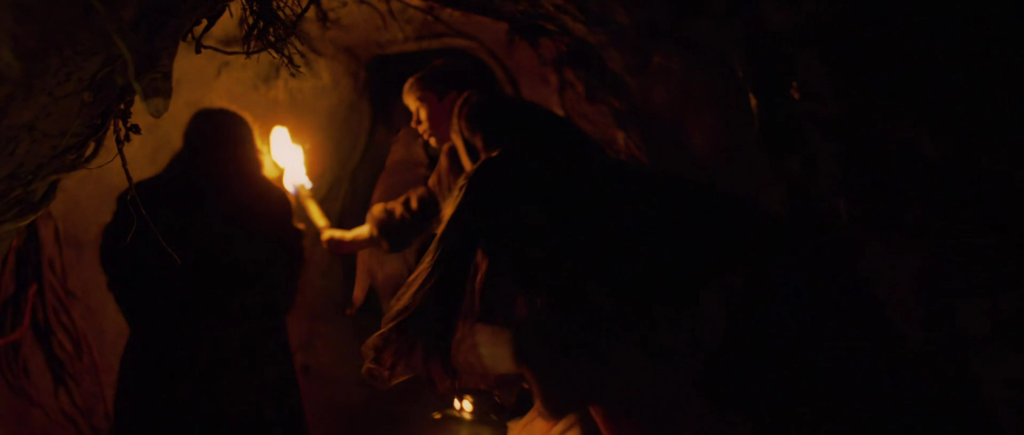
For a moment, it looks like Mr. Beaver has accidentally led them to a dead end, but it turns out there’s a hole above. The group clambers out into another part of the woods and blocks the entrance with a nearby barrel. When they have time to catch their breaths and look around, they see that this little village is full of stone animals, including a stone badger. “I’m so sorry, dear,” says Mrs. Beaver to her husband. “He was my best mate,” he says sadly.
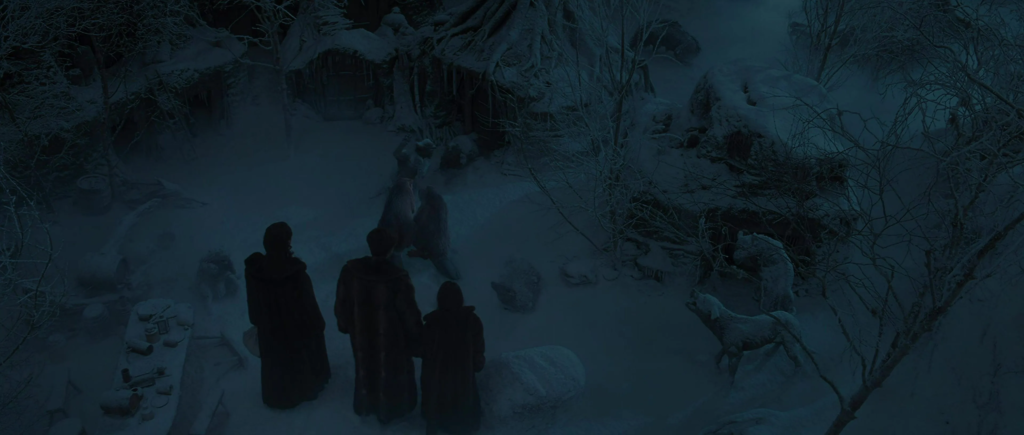
“What happened here?” asks Peter. “This is what becomes of those who cross the Witch,” says a new voice. It’s a fox (voiced by Rupert Everett.) This character will end up corresponding to a fox from the book but whereas that fox was a groveling victim of the White Witch, this one turns out to be a wily rebel against her. I like the character and Rupert Everett does a great job of voicing him[6]Though I’m given to understand that Everett himself, while eager to be part of an adaptation of The Lion, the Witch and the Wardrobe, was unhappy with the result, feeling that talking animals … Continue reading but I’m not a fan of the way he’s written.
Mr. Beaver: Take one more step, traitor, and I’ll chew you to splinters!
Fox: Relax. I’m one of the good guys.
Mr. Beaver: Yeah? Well, you look an awful lot like one of the bad ones!
Fox: An unfortunate family resemblance but we can argue breeding later. Right now, we’ve got to move.
Peter: What did you have in mind?
The term, “good guys,” feels too American to me to sit right in a Narnia movie.[7]“One of the goodies” might have been an improvement. Besides which, this whole exchange feels like something from a quippy action movie. Not that I don’t enjoy a fun quippy action movie now and then but it’s really not what I want from a Narnia adaptation. Basically, everything this fox says and a good deal of what the beavers say as well as anything out of Maugrim’s mouth feels like it belongs in a Star Wars-style action movie and not even a particularly distinguished one. Two of the screenwriters, Christopher Markus and Stephen McFeely, who would stick with this film series to the end, later went on to write Marvel movies and I’ve got to say, yeah, that feels about right.[8]I hasten to add that from what I’ve heard, some of their scripts for Marvel were really good with Avengers: Endgame even being put up for awards consideration. I hate myself for doing this but I’m going to have compare this movie negatively to the Charlie and the Chocolate Factory movie, which was released the same year and was also based on a popular English children’s fantasy novel. For all that that movie irritates me, both as an adaptation of its source material and as an overall viewing experience, and as much as I prefer The Lion, the Witch and the Wardrobe (2005) on the whole, I must acknowledge that John Augst’s script for Charlie and the Chocolate Factory feels like it was written by a wordsmith with a specific style, not produced by some automatic Hollywood screenplay writing machine. The generic pulpiness of The Lion, the Witch and the Wardrobe‘s script is particularly strong in this middle section so it’s a good thing it directly follows a really strong opening act, getting viewers invested in the characters, and is the most action filled part of the movie, making it easy to get caught up in the story and ignore the low quality of dialogue. For me, it doesn’t make the movie bad, but it keeps it from being as great as it could very well have been.
Back to the movie. We cut to the wolves bursting out the tunnel. They surround the fox, seemingly all alone, just as he’s finishing sweeping away the refugees’ footprints with his tail. (The movie doesn’t spell out that he’s doing that, but it can be inferred.)

Fox: Greetings, gents. Lost something, have we?
Maugrim: Don’t patronize me. I know where your allegiance lies. We’re looking for some humans.
Fox: Humans? Here in Narnia? Now that’s a valuable bit of information, don’t you think?
The voice actors do a good job of conveying that the idea of humans being something truly out of the ordinary in this world. As the fox speaks, we pan up to see that the Pevensies and the beavers are hiding in the branches of a tree. One of the wolves grabs the fox’s body with its jaws. Peter has to cover Lucy’s mouth to keep her from crying out and one of the beavers has to do the same for the other. I can’t tell which because apparently, I’m racist towards beavers.
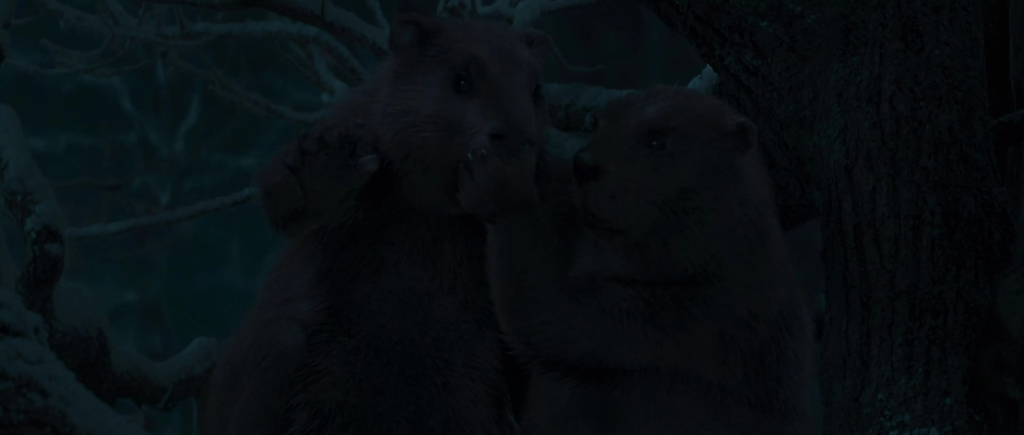
“Your reward is life,” says Maugrim, “it’s not much but still…” The fox raises a paw and for a moment, it looks like he might betray the heroes but, no, he says they went north. “Smell them out,” commands Maugrim and the wolves toss the fox’s limp body aside and run off. (I don’t know why their noses can’t lead them to the tree. Just go with it.) Fortunately, the fox’s wounds don’t prove to be fatal. We cut to Mrs. Beaver tending to them as the characters gather around a campfire. The fox explains that the badger and the other stone animals were caught helping Tumnus. (Apparently, Tumnus wasn’t actually in his house when the wolves broke into it. They had to track him here.) “Are you alright?” a concerned Lucy asks the fox in response to his yipping. This is a neat bit of foreshadowing as Lucy will soon become something a doctor albeit because she’ll receive a magic potion, not because of any particular medical skill on her part.
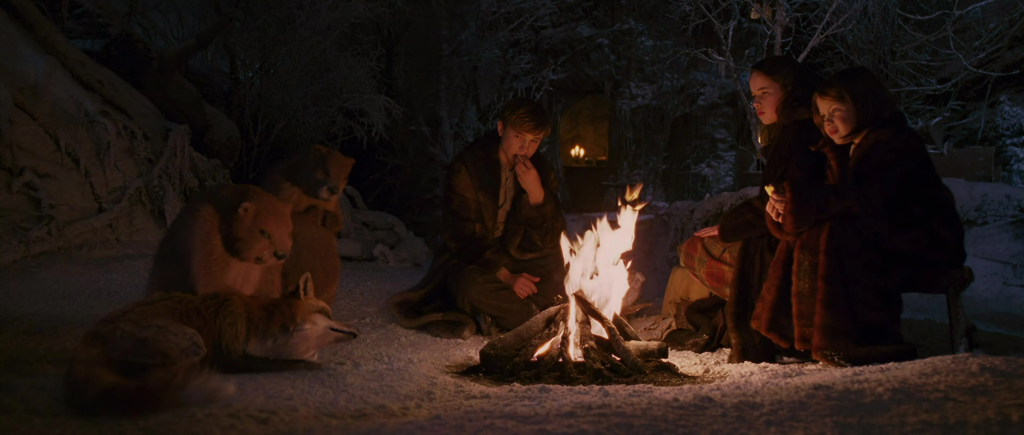
“I wish I could say their bark was worse than their bite,” quips the fox. You see what I mean about this dialogue being really generic? That’s the most obvious and predictable joke you could make about doglike characters in this scenario! “Stop squirming! You’re worse than Beaver on bath day!” Mrs. Beaver tells the fox. “Worst day of the year,” Mr. Beaver confides to the Pevensies. I’m not proud that I laughed at that line when I first heard it, but I did, and it is refreshing to see Susan and Lucy smile at it after seeing them be betrayed by their own brother and chased by fearsome wolves.
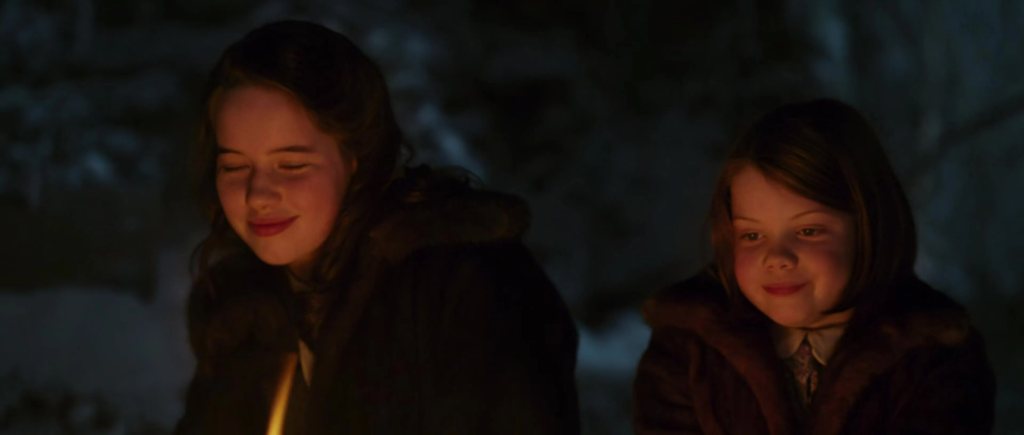
“Thank you for your kindness but I’m afraid that’s all the cure I have time for,” says the fox, rising. “You’re leaving?” says Lucy, disappointed. The fox bows to her, saying, “it has been a pleasure, my queen, and an honor.” This is the first time in the movie someone addresses any of the Pevensies as royalty[9]Unless you count Ginarrbrik calling Edmund “Sire.” and it’s something of a cool moment. “But time is short,” he continues, “and Aslan himself has asked me to gather more troops.” The beavers are impressed by this news. “You’ve seen Aslan?” Mr. Beaver asks incredulously. “What is he like?” Mrs. Beaver inquires. The fox smiles. “Like everything we’ve ever heard,” he says. If my memory of the filmmakers’ audio commentary is correct, this exchange was something of a late addition to the movie in response to test audiences feeling that the character of Aslan hadn’t been built up enough. A common criticism of this adaptation from book fans is that it doesn’t do enough to establish Aslan as the awe-inspiring figure C. S. Lewis intended. While this little moment doesn’t render that criticism untrue, it’s still a nice gesture.
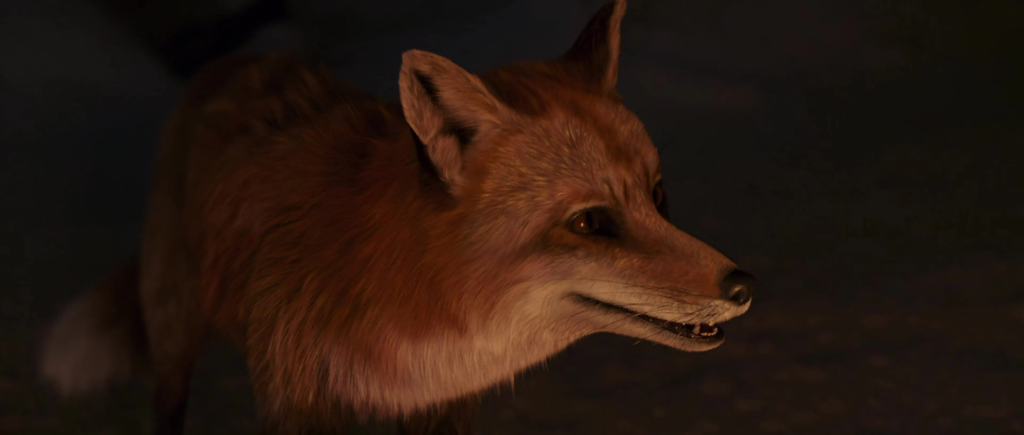
The fox also tells the Pevensies they’ll be glad to have Aslan on their side in the battle against the Witch. Susan quickly disclaims any intention of them fighting. “But, surely, King Peter, the prophecy…” the fox protests. “We can’t go to war without you,” says Mr. Beaver. All Peter can do is exchange a sad glance with Susan and says, “we just want our brother back.”
Edmund meanwhile sits in the White Witch’s icy dungeon with his legs chained. He gnaws at a hunk of dried bread. When it makes him gag, he tries to drink water from a cup but it’s frozen. Props to the adapters. The water wasn’t frozen in the book, so they actually managed to make Edmund’s sufferings worse. A prisoner in the adjoining cell asks for the bread if Edmund doesn’t want it. It’s Mr. Tumnus! (This is something of a change from the book which implies that Tumnus has already been turned to stone around this point. That’s just an observation, not a complaint by the way.) “You’re Lucy Pevensie’s brother,” he says. “You have the same nose.” Do Skandar Keynes and Georgie Henley really have similar noses? I’ve never noticed. “Is your sister alright?” he asks. From outside comes the noise of wolves yapping. “I don’t know,” Edmund says miserably.
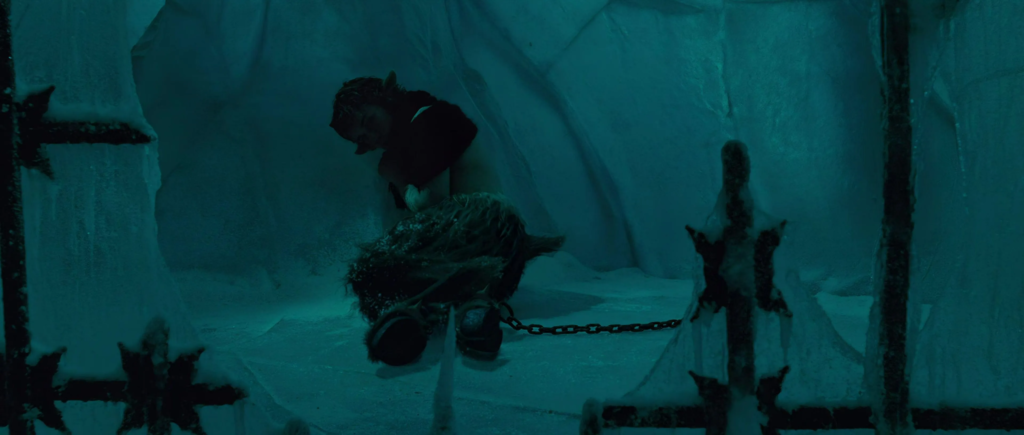
Tumnus and Edmund scoot away from each other as the Witch enters, followed by Ginarrbrik. In my last post, I criticized the decision to have the Witch’s fortress be made out of ice, calling it cliche for a winter-themed villain but the way the lighting in these scenes combines with her coloring really conveys that she’s in her element, making her extra intimidating, especially combined with the camera angles that emphasize her height. “My police tore that dam apart,” she tells Edmund, “Your little family are nowhere to be found.” The Witch grabs Edmund by the collar and lifts him into the air. (The character is noted for her strength in the books.) “Where did they go?” she demands. “I don’t know,” says Edmund. She drops him. “Then you are of no further use to me,” she says, raising her wand. Edmund is clearly seconds from being a lawn decoration. His mind races. “The beaver said something about Aslan,” he blurts out. Tumnus looks up and the Witch is rendered momentarily speechless. Another fan complaint about this adaptation is that it portrays the Witch as less frightened of Aslan than she is in the book, undermining the message that the powers of Goodness are stronger than those of Evil. Again, this critique has some weight behind it but, to be fair, the Witch’s reaction to the news of Aslan in this scene can easily be interpreted as fear and it’s a great dramatic moment.
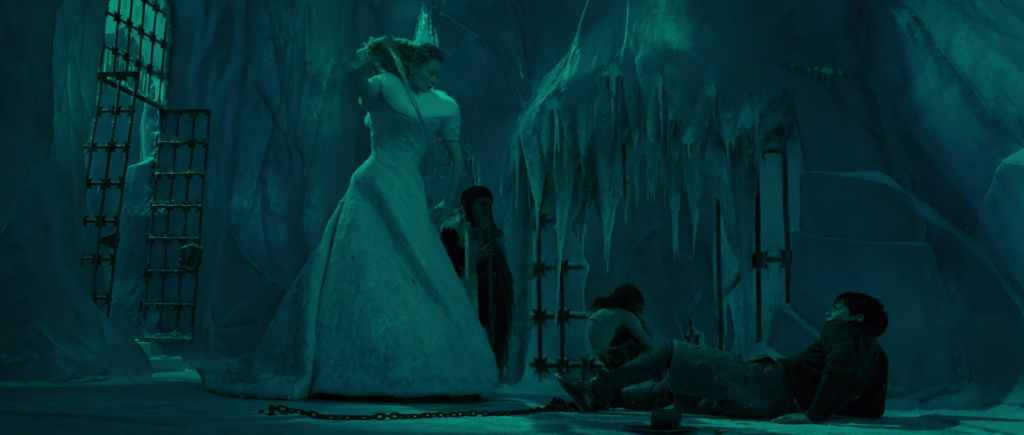
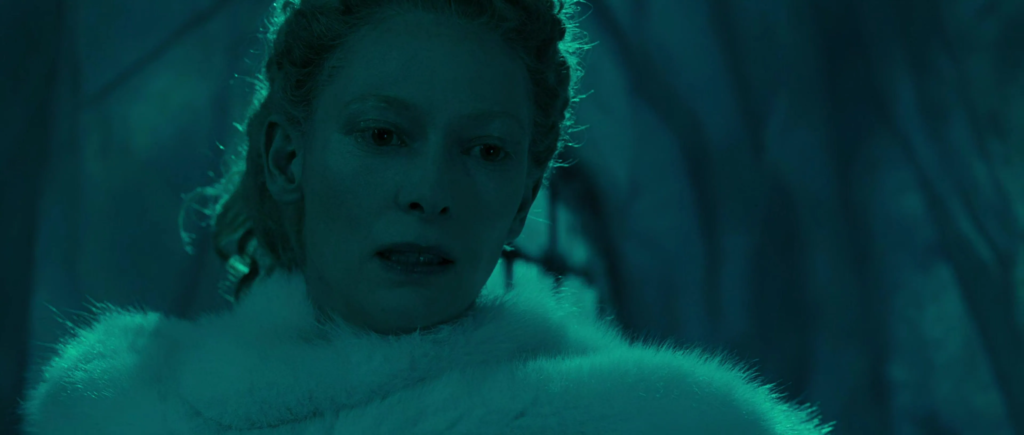
“Aslan? Where?” she asks. Tumnus anxiously interjects that Edmund as a stranger to Narnia couldn’t possibly know that. Ginarrbrik hits him on the head with the butt of a weapon. (I’m sorry I don’t know that particular weapon is called.) The Witch turns back to Edmund. “I said where is Aslan?” In response to Tumnus’s desperation, Edmund backpedals, saying, “I don’t know. I left before they said anything. I wanted to see you,” he adds, trying to turn it into flattery. In the book, Edmund tells the Witch everything about Aslan and the Stone Table as soon as he meets her. The movie has him withhold information to increase suspense though it doesn’t really end up impacting the plot at all. After observing Edmund suspiciously, the Witch calls for a guard who I think is an ogre. This is another minor change from the book which doesn’t introduce us to the Witch’s non-dwarf, non-wolf followers until the story’s final third. The movie has them slowly start to trickle in, starting here though we won’t see them in great numbers, including the ugliest ones, until the same point as in the book.
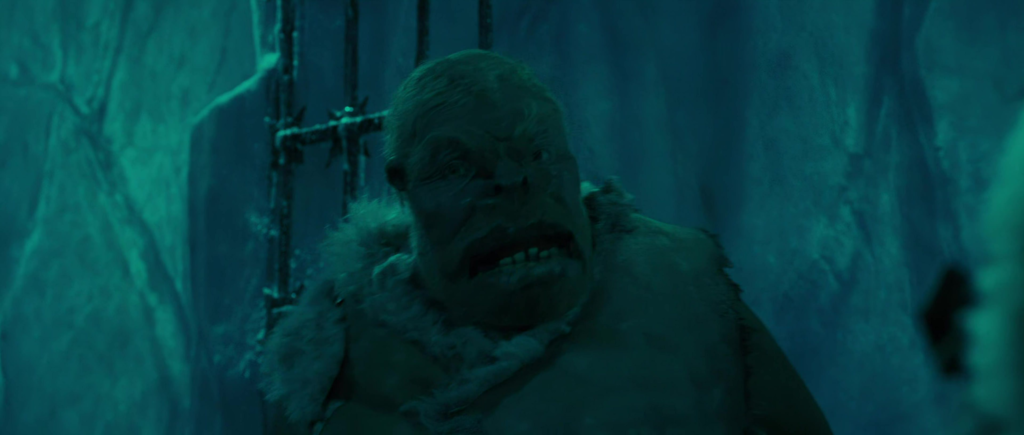
The Witch orders the guard to release Tumnus. He smashes the faun’s chains while they’re still on his hooves(!) and drags him before her. “Do you know why you’re here?” she asks. “Because I believe in a free Narnia,” he says. Ugh! That has to be the clunkiest line in the movie and it depresses me that it was given to such a well-cast actor in the role of such an iconic character. The Witch points at Edmund. “You’re here because he turned you in,” she says, “for sweeties.” Then she has the guard take Tumnus away and orders Ginarrbrik to ready her sleigh. (“Edmund misses his family.”) As he’s dragged off, Tumnus looks reproachfully at Edmund who, once he’s alone, buries his face in his knees. This does demonstrate the White Witch’s sadism but as a way to make Ed feel guiltier, which I assume was the intent, it doesn’t really make sense. Technically, it was his siblings and the beavers he betrayed “for sweeties.” He just blurted out Tumnus’s secret without having any idea of the consequences. I guess you could argue that by joining with the White Witch he was betraying all of Narnia or something like that. I do understand why the screenwriters felt the need to do something to show that Edmund was feeling guilty since viewers of the movie don’t have the direct access to his thoughts that readers of the book do.[10]You could argue that at this point in the book, Edmund wasn’t really feeling guilty so much as he was regretting his misdeeds for selfish reasons but that may be overanalyzing.
We transition to morning when the other Pevensies and the beavers stand atop a huge rock bridge, giving them the lay of the land. (This scene is kind of notorious among the fanbase for its poor greenscreen though, personally speaking, it doesn’t bug me much.)
Mr. Beaver: Now Aslan’s camp is near the Stone Table just across the frozen river.
Peter: River?
Mrs. Beaver: Oh, the river’s been frozen solid for a hundred years.
Peter: It’s so far!
Mrs. Beaver: It’s the world, dear. Did you expect it to be small?
Susan: Smaller.
That dialogue really doesn’t make sense. It’s true that in the Narnia books, the children who travel back and forth between worlds call going to the world of Narnia going to Narnia. But that’s just shorthand. Narnia is technically a country, not a world.
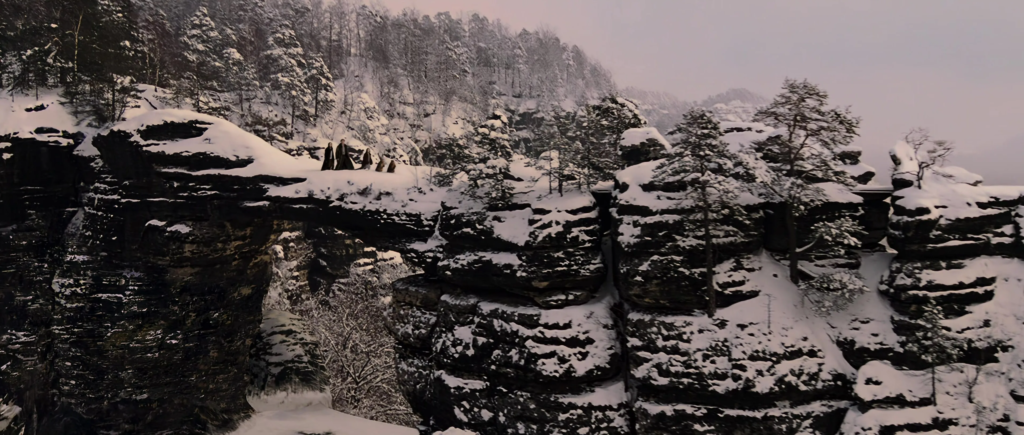
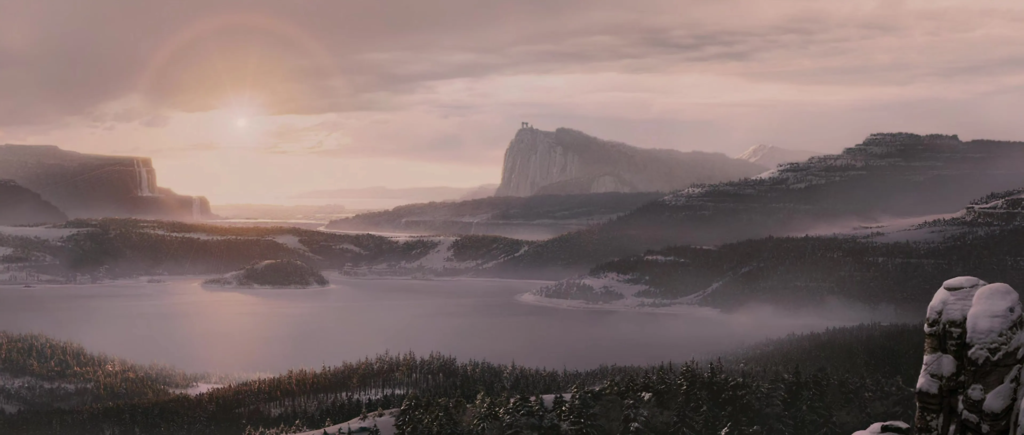
Meanwhile, Edmund exits the dungeon under the custody of Ginarrbrik and sees to his horror that the Witch has a new statue in her courtyard.
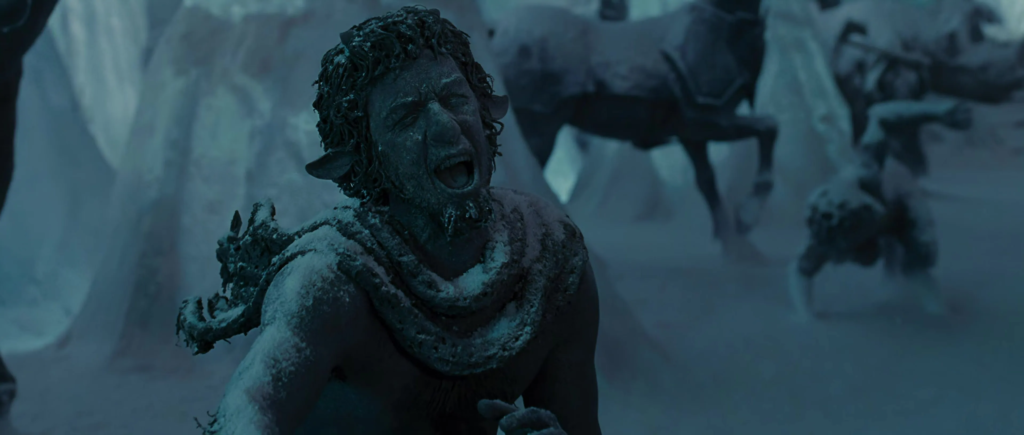
The Witch’s sleigh rockets out of the gates of her castle. Edmund is forced to sit at her feet. In the book, for purposes of stealth, she doesn’t use sleigh bells at this point. It sounds like she does in the movie, making her less smart but making it a better fake out for the viewers when…well, we’ll get to that in the next scene.
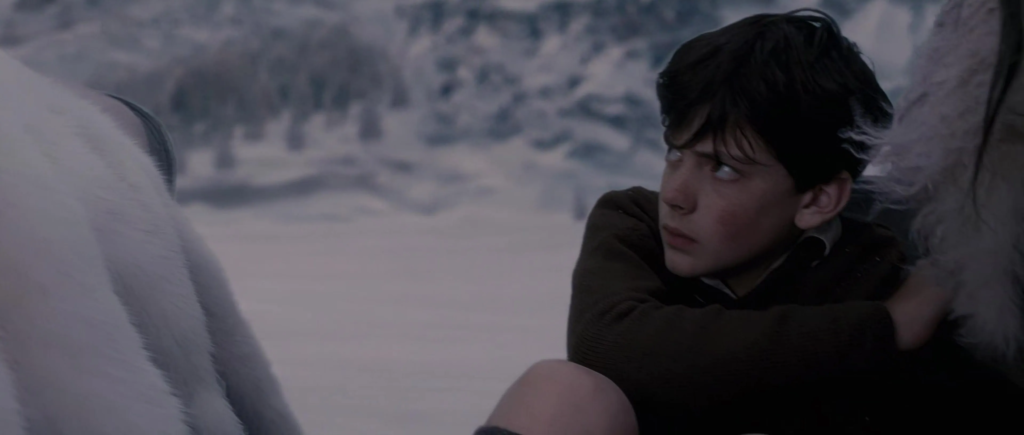
Next Week: The Spell Begins to Break
References
| ↑1 | Though genre-savvy viewers probably guess she does at this point. |
|---|---|
| ↑2 | Who also becomes a source of comic relief at the climax by the way. |
| ↑3 | This was so in an earlier draft on the screenplay. |
| ↑4 | Another exception is Kiran Shah as Ginarrbrik with his Persian accent. |
| ↑5 | For the record, I don’t think either the movie or the book should be interpreted as a metaphor for World War II. That idea really falls apart if you think about it for any length of time. C. S. Lewis did allude to real world dictators in the last chapter of The Magician’s Nephew, his prequel to The Lion, the Witch and the Wardrobe, in which Aslan tells two children from Edwardian England “Soon, very soon, before you are an old man and an old woman, great nations in your world will be ruled by tyrants…” |
| ↑6 | Though I’m given to understand that Everett himself, while eager to be part of an adaptation of The Lion, the Witch and the Wardrobe, was unhappy with the result, feeling that talking animals didn’t work in live action. |
| ↑7 | “One of the goodies” might have been an improvement. |
| ↑8 | I hasten to add that from what I’ve heard, some of their scripts for Marvel were really good with Avengers: Endgame even being put up for awards consideration. |
| ↑9 | Unless you count Ginarrbrik calling Edmund “Sire.” |
| ↑10 | You could argue that at this point in the book, Edmund wasn’t really feeling guilty so much as he was regretting his misdeeds for selfish reasons but that may be overanalyzing. |
